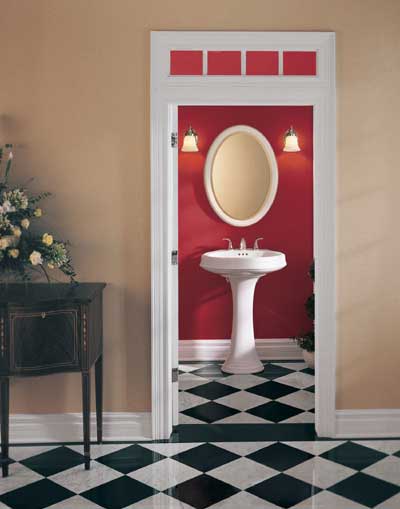Volume 3, Issue 5
December 2004

What's your style?
Avoid the decorating dilemma and identify your personal taste
A wise interior designer once said there are three rules to decorating a home.
It's just that nobody is quite sure what they are.
"In home décor, it can be confusing to pinpoint a style that accurately
reflects individual tastes," said Jason Feldman, director of style, innovation
and design for The Home Depot.
Few people are interested in decorating their homes strictly according to the
dictates of one particular style, explained Feldman.
"The truth is that most decorating schemes are a mix of styles," he said.
According to a recent poll conducted by Opinion Research Corporation on behalf
of Home Depot, 24 percent of respondents described their decorating style as "casual" followed
by 22 percent who said "country" best defines their tastes in home décor.
In fact, the term casual is really not a decorating style at all, according to
Feldman.
"Mention a Victorian parlor or traditional living room and you can picture what
that room may look like," said Feldman. "Casual is more of a lifestyle than a
decorating style."
The term country, too, can be misleading when used to describe a decorating style.
It means Americana or shabby chic to some and French country or Tuscan to others.
"Whatever your style, you must first learn to trust your gut instincts. It's
important to develop a plan that achieves the look you want while at the same
time allowing room for the things you love," said Feldman.
For the most part, North America has seven decorating styles: Country, Colonial,
Victorian, Arts and Crafts, Traditional, Southwestern and Contemporary, said
Feldman. Following is an explanation of each style.
Traditional: Link with the past
Interiors of the past and popular trends of today blend to create the comfortable
and timeless design called Traditional. The aim is not to reproduce looks of
the past, but to rethink or reinvent them for the modern home, said Feldman.
Rooms are open and airy with large highly-curtained windows, stained or faux
painted wood and comfortably upholstered furniture in rich-looking velvet, silk,
brocades and damask fabrics.
Country: Simplicity
Whether American or European, Country style speaks to the simple life. It is
highly personal, allowing for a freedom of expression and a mix-and-match spirit.
High-end antiques and yard sale treasures mix in a Country home. Look for simple
wooden furniture and window treatments, area
rugs scattered near beds, benches
and high-backed chairs.
Colonial: Coming of age
When most of us think of Colonial style, George Washington's family home, Mount
Vernon, comes to mind. It is about global involvement, fascination with philosophy,
science and the flow of ideas. Homes decorated in the Colonial style have lots
of books, Oriental carpets or simpler alternatives like painted floor cloths
and stenciled flooring, as well as wood paneling and wainscoting, chair rails,
tall ceilings and linen or calico window
treatments hung by tabs.
Southwestern: Fluid forms
Spanish culture in the Southwest was so pervasive that it left a strong imprint
on the region's architecture and interior décor. Main rooms are anchored
by adobe, kiva-style fireplaces, walls are hand-finished in tinted plaster and
floors are covered with unglazed clay tiles or wide-plank boards. Look for boldly
patterned Navaho rugs, found objects from nature and regional art and pottery.
Victorian: Romance and excess
Named after England's Queen Victoria who ruled from the mid-19th century to the
early 20th century, Victorian style is all about details and more details. Clutter-like
knickknacks and embellishment, such as oversized fringe, is found everywhere.
Today, modern interior decorators and designers have distilled Victorian lavishness
and scale to fit more comfortably in modern homes.
Arts & Crafts: Nature calls
Designers behind the Arts and Crafts movement, known as Craftsman, were on a
mission - to cure society of the excesses of Victorian style. With its emphasis
on simplicity and use of natural elements, the style was popular for about 15
years at the turn of the 20th century, but is seeing renewed interest today.
Room layouts are open with sturdy columns, exposed beams and doors with massive
strap-hinges and hardware.
Contemporary: Machine for living
Materials are straightforward and clutter is nowhere to be found in a contemporary
home setting.
"Metal looks like metal and plastic looks like plastic," said Feldman. "There's
a restful simplicity found in quiet muted colors, horizontal lines and low-slung
furniture."
Some contemporary designers draw on a high-tech look with commercial fixtures
and furniture.
New Products



![]() visit InteriorDecorating.com
or call 1-800-590-5844
visit InteriorDecorating.com
or call 1-800-590-5844
P.S. Remember, you can find
InteriorDecorating.com
fast by using the AOL keyword: InteriorDecorating
|
|
2103 Fort Street Barling, AR 72923 Ph: (800) 590-5844 |
|
Copyright ©1997-2013
Interior Purchasing, Inc.
|
|

